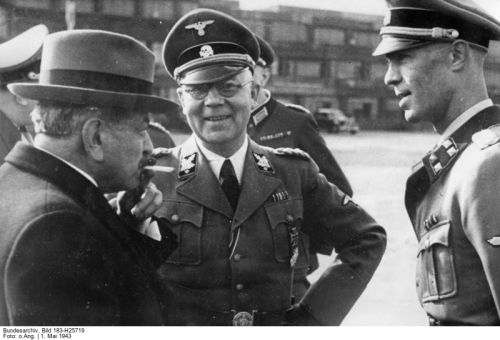Karl OBERG

Karl Oberg, centre, with Pierre Laval and Herbert Hagen, Paris 1943
Karl Oberg was born on January 27, 1897, in Hamburg, the son of a Professor of Medicine. He enlisted in the army in August 1914, fighting as a Lieutenant on the Western Front in September 1916 and was awarded the Iron Cross (First and Second Class). After the end of the First World War he was involved in suppressing a mutiny and participated in the Kapp putsch in Berlin.
In January 1921, he was the business manager of the Eschereich Organisation in Flensburg and then liaison man between various Reichswehr formations, the government and local patriotic leagues in Schleswig. In 1926, he returned to Hamburg as the representative for a wholesale paper merchant and two years later took a job with a wholesale tropical fruit firm. As a result of the world economic crisis the firm went out of business within a few months and Oberg was unemployed until the end of 1930. He then bought a tobacco kiosk in Hamburg with the help of a small loan, provided by his family.
In 1932, Reinhard Heydrich took him into the Sicherheitsdienst (SD), where he became one of his closest collaborators, following him to Munich and then Berlin, to establish the Reich Main Office of the Security Service (RSHA). Karl Oberg's hard work was rewarded by a rapid rise through the SS ranks. He was an SS Captain in March 1934, an SS Major in July 1934, and a year later he was an SS Colonel, and he acted as one of Heydrich's right-hand men in the SD. He was respected for his decency, his bureaucratic meticulousness and discipline.
However, differences between the two men, partly caused by the age gap- Oberg was seven years older than his superior - led Oberg to return to the SS, where he took command of the 22nd SS Regiment in Mecklenburg, and he was subsequently head of the SS Abschnitt IVA in Hannover until December 1938. In January 1939, Karl Oberg was appointed to the post of Police President at Zwickau in Saxony.
Following the occupation of Poland Karl Oberg was appointed to the post of SS and Police Leader in Radom, where he took part in the extermination of the Jews and harsh measures against the Polish population. Karl Oberg was promoted to SS Major General during April 1942, Karl Oberg, the tall, robustly -built, bespectacled Northern German was posted to Paris on May 7, 1942, to take command of the SS and SD in occupied France.
Oberg's appointment to the post of Higher SS and Police Leader for Northern France and Belgium led to a radical change in the relationship between the military administration and the German Security Services, which henceforth possessed executive powers and were responsible for the security of troops behind the lines. Completely independent of General Karl von Stuelpnagel, the Military Governor of France, Oberg proved himself a disciplined Nazi, at the same time ensuring the obedience of French collaborationists and militia groups and making his Gestapo officers feared and detested by the French population.
Karl Oberg was responsible for issuing the Jewish -badge decree for occupied France shortly after his arrival, and for other repressive measures undertaken against the French Resistance. After the Allied invasion of Normandy and the subsequent liberation of Paris, Oberg and his men returned to Germany in December 1944, where he was appointed Commander -in-Chief of the Weichsel Army under direct orders from Heinrich Himmler.
At the end of the war Oberg went into hiding in a Tyrolean village but he was arrested by American Military Police in June 1945. He was sentenced to death by a court in Germany, but he was extradited to France on October 10, 1946, to stand trial there. On February 22, 1954, Karl Oberg, and SS-Colonel Helmuth Knochen appeared before a Paris military tribunal sitting in the Cherche-Midi prison. Although Oberg had already been interrogated 386 times, his trial was adjourned . On October 9, 1954, he was once again sentenced to death , but the sentence was commuted to life imprisonment by a presidential pardon ratified on April 10, 1958.
A further decree of October 11, 1959, further reduced the sentence to 20-years' forced labour from the date of the sentence. Oberg was finally pardoned by President Charles de Gaulle and was repatriated to Germany, in 1965. Karl Oberg did however not enjoy his freedom for long, as he passed away on June 3, 1965.
Sources
R.S. Wistrich, Who’s Who in Nazi Germany, published by Routledge, London and New York 1995
G. Reitlinger, The Final Solution, published by Sphere Books Ltd, London 1971
Photograph – Bundesarchiv
© Holocaust Historical Society 2018

